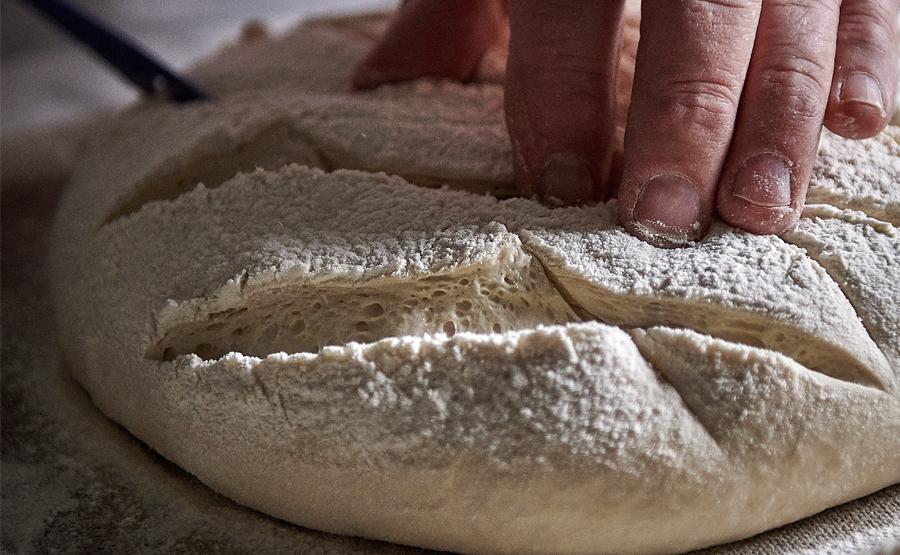The Benefits of Long Sourdough Fermentation
Bread is made with flour, water and salt, and another important ingredient: time. Typically bakers choose between bakers’ yeast and sourdough to raise their dough. With bakers’ yeast, it’s possible to produce fresh out of the oven bread within 2 hours, but with sourdough you need more time. In fact to make good sourdough bread you need hours, sometimes even days, to arrive at your delicious bread. Is sourdough really worth the wait? It is! Just like with matured wines and cheeses, the extra time taken to make bread also results in more taste, and… new research shows that this extra time can even bring additional health benefits. Let us tell you more!

WHAT ARE THE BENEFITS OF SOURDOUGH?
Wow, not so fast! First up, what is sourdough? Sourdough is a natural leavening ingredient made from flour and water. In sourdoughs, a culture of natural yeasts and lactic bacteria thrive on warmth and flour. When you add this sourdough culture to bread dough, the lactic bacteria and natural yeasts slowly ferment the dough while you wait. They convert the carbohydrates and proteins in the flour into lactic acid, acetic acid, and CO2, or in simpler terms: they convert the carbohydrates and proteins in the flour into taste while making the dough rise.
Sourdough has its own life, and you’ve got to be a true expert to control it. Breads fermented with sourdough are even tastier than everyday bread, and new research indicated that they can even be easier to digest too, and that this is due to the long fermentation process. In principal, our body needs about 18 hours to digest flour; following sourdough fermentation the sourdough bread has already started a large part of this digestive process. This causes more vitamins, minerals and amino acids to be released and helps new flavours to develop. Furthermore, sourdough bread gives your body a satisfied feeling quicker.
Our Sourdough Librarian Karl De Smedt met up with sourdough-expert Professor Marco Gobbetti to learn more about the benefits of sourdough. Prof. Gobbetti compared the digestibility of three breads; one with just bakers yeast, one with both sourdough & bakers yeast, and a third with just sourdough. The conclusion? “Sourdough fermented breads are more digestible than those started with bakers yeast alone.” Gobbetti goes on to explain, “We demonstrated in a unique way, by examining the emission of gas during digestion, the transit of the bread in our intestinal track, and the absorption of nutrients, like free amino acids, that the sourdough bread was more digestible then all the other types of bread.”
-
In Gobbetti’s study the sourdough fermented breads had a lower ‘GI-index’: A low GI-index food means it releases its energy more progressively over a longer period of time and requires less insulin. In other words: our body needs more time to absorb slow sugars, meaning we don’t feel hungry again as quickly.
-
Interestingly, even though people feel “full” for a longer time, sourdough bread doesn’t occupy the digestive system for a long time and therefore does not make the digestion process a long and laborious affair.
-
The sourdough breads in the experiment delivered a higher ‘Free Amino Acids’ content, for a longer period of time than regular breads. Free-form AAs are single amino acids, which need no digestion. They are, in essence, pre-digested and ready to form the enzymes needed for optimal food digestion and the development of proteins.

CRUMBS OF KNOWLEDGE:
-
Altamura or Pane di Altamura is where one of the oldest breads from Italy’s province of Bari comes from. In 37 BC, the Roman poet Horace praised the bread from the region, and suggested that it was the best bread in the Roman Empire. Altamura bread is still baked by local bakers following the same original recipe passed down over the generations. The bread and the sourdough are made with ‘durum’ grains, which grow abundantly in the Altamura region. Durum is rich in flavour and takes in more water than standard grain types, meaning the bread does not dry out so quickly. Add salt, water and the special Altamura sourdough to this durum flour, and you will bake fantastic bread that is still amongst the best today.
-
Sourdough does not necessarily mean sour, indeed it all depends on the conditions in which the fermentation takes place. By feeding the mother dough more often for example, the production of lactic acid bacteria (which causes the sour taste) can be limited. Sourdoughs still aren’t the easiest things to keep under control, as they often have a “life of their own”. In short, you need to be a real expert to keep and control a sourdough.

Comments
Hi I am from India.i bake sourdough bread .Your blogs are just amazing filled with lots of great infos.Thank you so much ! could anyone help me to explain the last line plz ??
Thanks
Kakoli